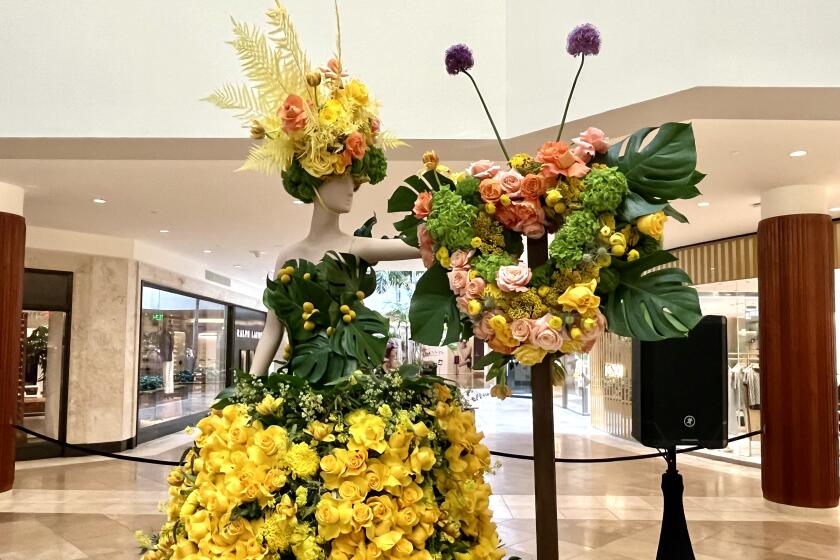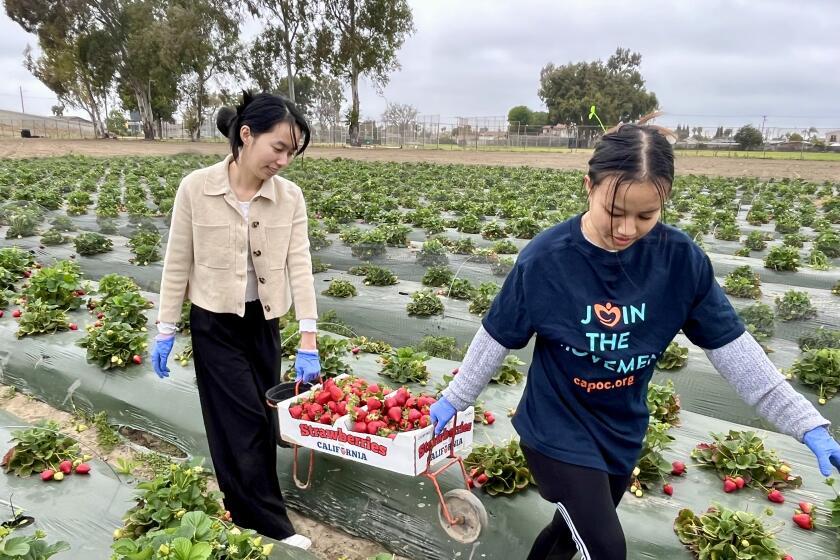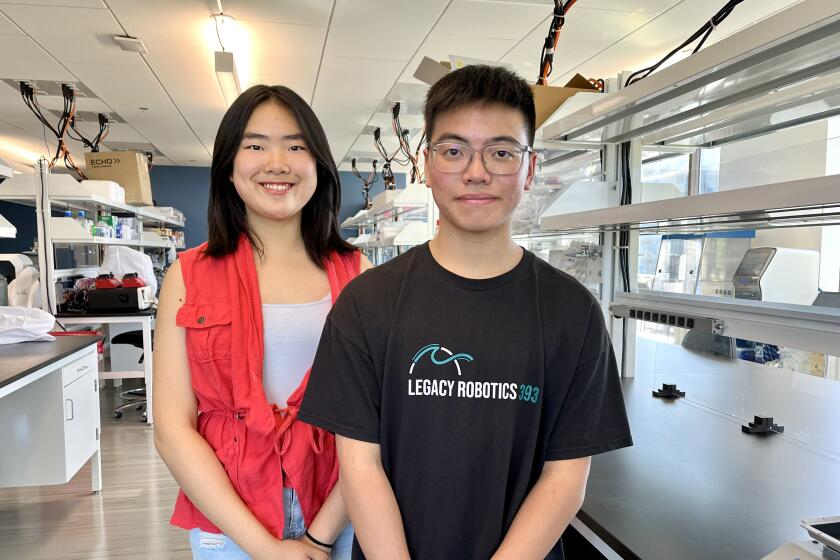For help handling social media’s exposure, academic pressure and other student struggles, there’s One Recovery
She hasn’t had a drink since passing out in a bathroom stall during a football game.
On that Friday night in mid-September, she remembers partying at a classmate’s house, where she consumed one Red Bull and vodka after another.
For the record:
12:55 a.m. April 25, 2024A previous version of this post misspelled One Recovery program founder Lynne Pedersen’s surname.
The student, who is not being identified because of her age, pulled out her phone to broadcast the good times on Snapchat. It was exhilarating to know that her followers would share in the fun.
Then she and her friends rode in an Uber car to the game. That was the last thing she remembered.
She has no recollection of an assistant principal calling for an ambulance to take her to a hospital from Orange Coast College, where the Battle of the Bay, an annual rivalry game between Newport Harbor and Corona del Mar high schools, was underway.
The next week, she and her parents were called to the administration office at Corona del Mar High School. The assistant principal at the time told her she had two options: suspension or enrolling in the eight-week One Recovery program.
The suspension could have cost her college admission.
She took the eight weeks. So did a dozen others found intoxicated at the game.
The program has been serving a generation in which academic pressure is rising, self-medicating is common, over-sharing is encouraged and self-worth is tethered to social media “likes.”
Program founder Lynne Pedersen, who has served as executive director of Newport Academy, a residential adolescent treatment center, brought One Recovery to Corona del Mar High in 2015.
Students often are referred, but others attend voluntarily.
“We’re all recovering from something,” Pedersen often says at One Recovery, which has reached students dealing with substance abuse, bullying and school performance pressures with art and human connection.
As part of the program, students meet weekly in The Sea King Connection, a small campus building where sessions begin with a quiet, meditative moment, a discussion where students share their experiences and feelings in confidence, and then conclude with a group activity involving art or a guest speaker.
I think there’s an incredible pressure put on kids, and I think when you have that, it can be overwhelming and you look for a way to numb it.
— Jill Manly, head coach of the junior varsity girls’ basketball team at Corona del Mar High School
Meanwhile, parents may simultaneously attend a meeting at the school library, where an open forum takes place with different facilitators, local clinicians and One’s parent coordinator, Stacia Deiro.
Don Grant, chairman of the American Psychological Assn. Device Management Committee, has attended several One meetings as a guest speaker.
“This is a generation that is underdeveloped and overexposed,” Grant said. “You can create a life that looks so spectacular [on social media], and that can make me evaluate my own life and feel bad. But what Lynne is doing on her own dime is creating an amazing, beautiful community for kids to be a part of, and that’s not going to happen on Instagram.”
The academic pressure to perform in Newport Beach, where admission to a well-regarded college is the expectation, is apparent online, where often only successes are flaunted.
“There’s so many eyes on them, especially with social media … it emotes that you can’t fail in privacy anymore,” CdM’s former assistant principal, Daniel Patterson, said in an interview last year. “Either you admit that you failed or you pretend that you didn’t, which can lead to negative outcomes.”
The student interviewed for this article said One played a part in helping her stop taking Xanax, a habit she developed her freshman year to ease her public-speaking anxieties.
She remembered the red face and shaking hands she had during a previous speech she had given. On Xanax, which she obtained over the phone without a prescription, she hadn’t broken a sweat.
“I thought about all the upcoming presentations I would have to do,” she said. “After I had used it, I thought, ‘I’m going to get more.’ ”
Another student who voluntarily attends One said it’s a normal occurrence to see her peers holding red cups filled with alcohol or vaping on social media.
“You’ll hear things like, ‘If it wasn’t on Snapchat, did it even happen?’ ” said the student, who also is not being identified because of her age. “Kids will never use social media to share the bad things going on in their lives. But at One, you can share that maybe you got a bad grade on a test or your parents are getting divorced and everyone there will support you.”
Pedersen brings in guest speakers who have overcome their own substance addictions, which the second student said is more effective than being “slammed by numbers and facts” on the dangers of drugs and alcohol.
“I’m all about abstinence from any self-harm behaviors,” Pedersen said. “But what I also have to do realistically is meet the kids where they are and offer them the power of awareness and the power of choice.”
The Newport-Mesa Unified School District, which includes CdM, and One Recovery have agreed to expand the program districtwide. One Recovery also has set up shop at Ensign Intermediate School in Newport Beach and held several events at Newport Harbor High School.
“Never in my 33 years of working mental health have I seen a school with [a principal like] Kathy Scott and a school district that has stood in more for these kids,” Pedersen said of the CdM principal. “They want to get these kids help, and that’s important.”
Pedersen funded One after selling her house in Sierra Madre, where she and her former husband had handpicked the fireplace stones.
Deiro, who previously worked with Pedersen at Newport Academy, asked if Pedersen could introduce the program to CdM.
Since then, the CdM Foundation, PTA and individual parents have donated to One at events and online at 1recovery.com.
Jill Manly, head coach of the junior varsity girls’ basketball team at CdM, and her husband, John, have contributed.
“I’ve lived here so long and I’ve gotten to know how great the families are,” Jill Manly said. “But when something is unpleasant, people don’t want to talk about it, and that’s the one thing that hurts a community ... the shame.”
“I think there’s an incredible pressure put on kids, and I think when you have that, it can be overwhelming and you look for a way to numb it,” she added. “What One is doing is saying, ‘Let’s talk about it’ and taking away that feeling of shame.”
At a One Recovery meeting in April, students came ready to paint on blank canvases.
But before they picked up the brushes, they told the group how they were feeling.
“Drained.”
“Happy.”
“Tired.”
“Doing better.”
“I’ve been having a bad day.”
“So what’d you do about it?” Pedersen asked.
The student looked around the room and said, “I came here.”
Twitter: @AlexandraChan10
All the latest on Orange County from Orange County.
Get our free TimesOC newsletter.
You may occasionally receive promotional content from the Daily Pilot.




